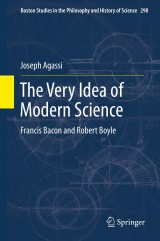Details

The Very Idea of Modern Science
Francis Bacon and Robert BoyleBoston Studies in the Philosophy and History of Science, Band 298
|
96,29 € |
|
| Verlag: | Springer |
| Format: | |
| Veröffentl.: | 14.12.2012 |
| ISBN/EAN: | 9789400753518 |
| Sprache: | englisch |
| Anzahl Seiten: | 315 |
Dieses eBook enthält ein Wasserzeichen.
Beschreibungen
This book is a study of the scientific revolution as a movement of amateur science. It describes the ideology of the amateur scientific societies as the philosophy of the Enlightenment Movement and their social structure and the way they made modern science such a magnificent institution. It also shows what was missing in the scientific organization of science and why it gave way to professional science in stages. In particular the book studies the contributions of Sir Francis Bacon and of the Hon. Robert Boyle to the rise of modern science. The philosophy of induction is notoriously problematic, yet its great asset is that it expressed the view of the Enlightenment Movement about science. This explains the ambivalence that we still exhibit towards Sir Francis Bacon whose radicalism and vision of pure and applied science still a major aspect of the fabric of society. Finally, the book discusses Boyle’s philosophy, his agreement with and dissent from Bacon and the way he single-handedlytrained a crowd of poorly educated English aristocrats and rendered them into an army of able amateur researchers.<br>
Preface.- Acknowledgement.- PART I: BACONS DOCTRINE OF PREJUDICE.- (A study in a Renaissance Religion) Introductory Note .- I The Riddle of Bacon .- (1) The Problem of Methodology.- (2) II Bacon’s Philosophy of Discovery.- III Ellis’ Major Difficulty .- IV The Function of the Doctrine of Prejudice.- V Bacon on the origin of error and prejudice .- VI Prejudices of the Senses.- VII Prejudices of Opinions.- VIII Bacon’s Influence .- IX Conclusion: The rise of the commonwealth of learning .- PART II: A RELIGION OF INDUCTIVISM AS A LIVING FORCE.- A Quasi-Terminological Note .- On the recent literature .- Homage to Robert Boyle .- I Background Material.- II The social background of classical science.- III The Missing Link between Bacon and the Royal Society of London.- IV Boyle in the Eyes of Posterity.- V The Inductive Style.- VI Mechanism.- VII The new doctrine of prejudice.- Appendices.
This book is a study of the scientific revolution as a movement of amateur science. It describes the ideology of the amateur scientific societies as the philosophy of the Enlightenment Movement and their social structure and the way they made modern science such a magnificent institution. It also shows what was missing in the scientific organization of science and why it gave way to professional science in stages. In particular the book studies the contributions of Sir Francis Bacon and of the Hon. Robert Boyle to the rise of modern science. The philosophy of induction is notoriously problematic, yet its great asset is that it expressed the view of the Enlightenment Movement about science. This explains the ambivalence that we still exhibit towards Sir Francis Bacon whose radicalism and vision of pure and applied science still a major aspect of the fabric of society. Finally, the book discusses Boyle’s philosophy, his agreement with and dissent from Bacon and the way he single-handedlytrained a crowd of poorly educated English aristocrats and rendered them into an army of able amateur researchers.<br>
New explanation of the contribution of the scientific societies of the classical era Gives a comprehensive account of ideology of the amateur scientific societies Thesis written by one of Karl Popper's students ?

















